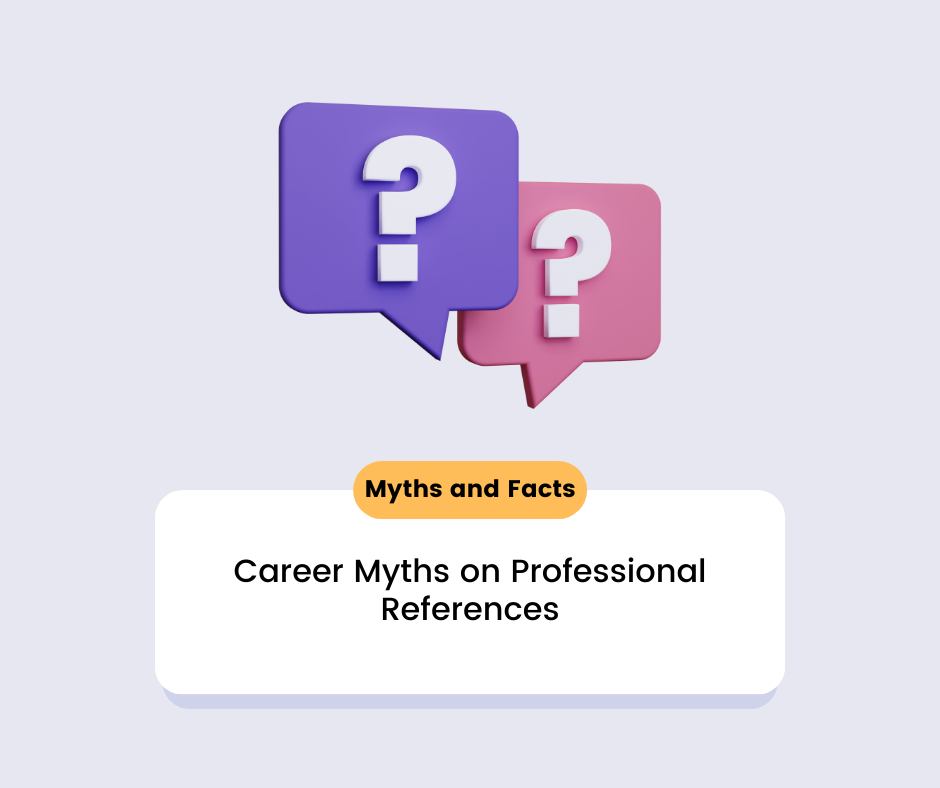In the ever-evolving world of careers and job searches, various myths and misconceptions often circulate, leading job seekers astray. These false beliefs can hinder progress and limit opportunities. To shed light on the truth and help individuals make informed decisions, this article aims to debunk common career myths arround professional references.
Myth 1: References are irrelevant to the job search process
References play a vital role in the job search process, contrary to this common myth. Employers often request references to gain insights into a candidate’s work ethic, skills, and character. Including strong references who can vouch for your abilities and professionalism can significantly enhance your chances of landing a job. It is essential to select references strategically, ensuring they can provide relevant and positive feedback. Now a days companies send our reference check forms to be filled by the references you sight during the selection process. Its becoming an integral part of the job selection process.
Myth 2: Bad references can be omitted from resumes
Some job seekers mistakenly believe they can omit negative references from their resumes. However, employers may conduct their own research and reach out to individuals not listed on the resume. It is crucial to maintain positive relationships with past employers and colleagues to prevent any negative references from influencing the hiring decision.
Myth 3: References are only contacted at the final stages of the hiring process
Employers may contact references at various stages of the hiring process, and it is not limited to the final stages. By listing references on your resume or application, you provide employers with an opportunity to contact them early on. Consequently, it is important to inform your references in advance, ensuring their availability and willingness to speak on your behalf.
Myth 4: Including a current boss as a reference is unnecessary
Contrary to this belief, many employers prefer to hear from a candidate’s most recent boss or supervisors. These individuals can offer insights into your recent work performance, responsibilities, and character. Therefore, it is advisable to include a current or recent boss as a reference unless there are extenuating circumstances that make it unwise or impossible to do so. If you are a fresher do include the name of your academic guide/supervisor as a reference.
Myth 4: “References Available Upon Request” must be included on resumes
Including the phrase “References Available Upon Request” is unnecessary and considered outdated. Employers understand that references are typically available upon request, and dedicating valuable resume space to this statement is redundant. Instead, focus on highlighting your skills, experiences, and accomplishments. Employers will surely ask for reference anytime during the selection process.
Career myths can misguide job seekers and hinder their chances of success. References play a crucial role in the job search process, and it is essential to select them wisely, maintain positive relationships, and communicate with them regarding your job search. By dispelling these myths, I hope to help individuals make informed decisions and achieve their career goals.
References and Further Reading:
- https://money.usnews.com/money/blogs/outside-voices-careers/articles/2018-04-17/these-common-reference-myths-are-hurting-your-job-search
- https://sg.finance.yahoo.com/news/common-reference-myths-hurting-job-160741043.html
- https://jobsearchandinterviewcoach.com/5-dangerous-myths-about-job-references/
- https://www.psychologytoday.com/au/blog/how-do-life/201805/killer-myths-about-job-references
- https://blogs.chapman.edu/career/2020/10/06/myth-vs-facts-resumes/
- https://jobsearchandinterviewcoach.com/5-dangerous-myths-about-job-references/
